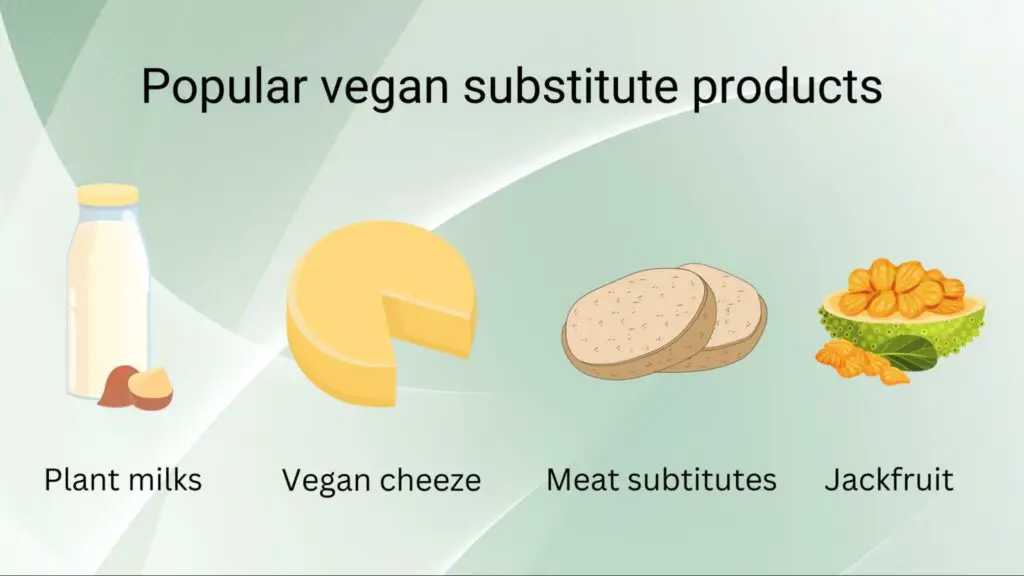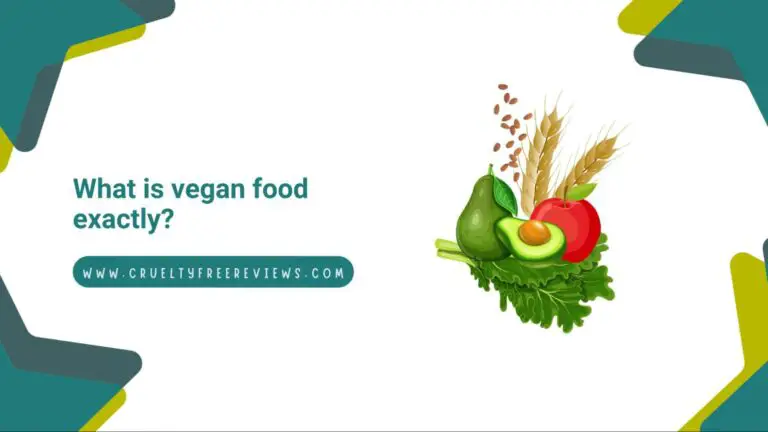Vegan food is exclusively sourced from plants. Vegan diets exclude everything connected to animals such as dairy, meat, honey, and so on. While this may seem like a lot to give up, there is plenty of food that vegans can eat. The most common plant-based foods are vegetables, fruits, nuts, grains, and legumes such as beans and lentils. So, being vegan doesn’t mean you are eating only salad.
Vegan food is usually healthy and nutrition-rich, however, there is more processed food each year which is most of the time as unhealthy as the non-vegan version. Nowadays you can buy vegan food anywhere in the world in any supermarket or smaller shop since some of the main plant-based items are basic food such as rice and beans.
On the other hand, there are many foods that look or sound like plant-based products, however, they are not. The best example is the gummy bear which appears to be a harmless sweet but is actually made from bone. Furthermore, there are more tricky ingredients, especially the food colors. One of the red food colors – labeled E120 – is made from insects. So you should avoid everything that has red food colors and doesn’t have a “V” label.
Table of Contents
What does vegan mean in food?
In short vegan food contains no ingredients of animal origin. However, according to the definition, veganism is a way of life that excludes anything to do with the exploitation or suffering of animals. So vegans are not only eliminating ingredients of animal origin from their diets but also those that may have anything to do with animals.
The best example of this is the palm oil. Although palm oil may seem like a plant-based substance at first glance, the truth is that it is far from it. Palm oil plantations are destroying rainforests in many places, reducing the habitat for the animals that live there. This is exacerbated by the fact that animals such as the orangutan, which live in these areas, are already classified as endangered species.
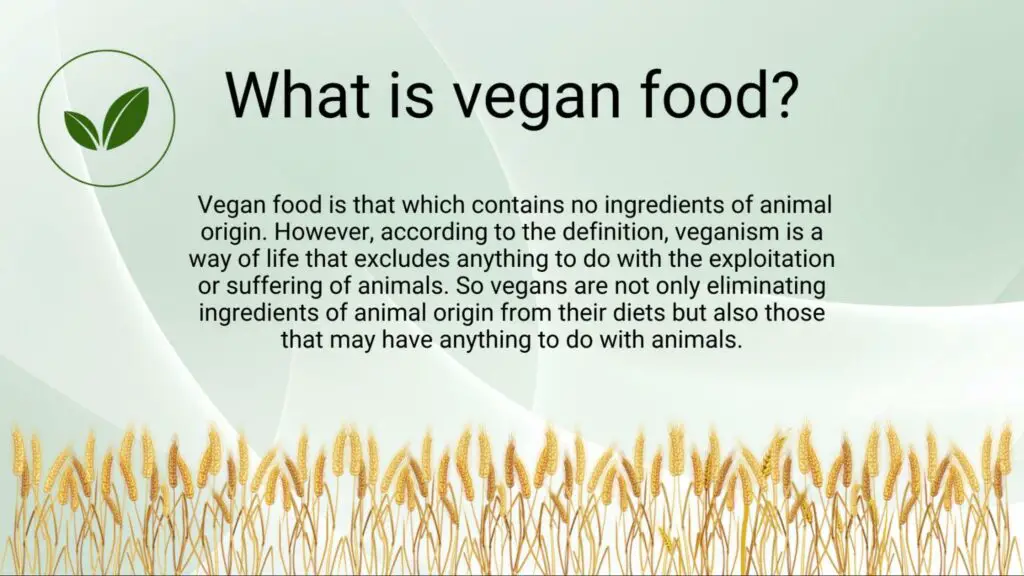
Is vegan food healthy?
Generally speaking, the answer is yes, vegan food is healthy. Most of the naturally plant-based items are healthy such as vegetables, nuts, fruits, grains, and legumes. Numerous studies show that a vegan diet reduces obesity, the risk of cardiovascular disease, and the incidence of cancer among vegans.
However, nowadays the market for vegan substitutes is on the rise. There are plenty of plant-based alternatives for cheese, meat, and other animal products that are often unhealthy. Furthermore, many junk-food like french fries, tortilla chips, and soft drinks are plant-based by defeult.

What foods can I eat on a vegan diet?
As mentioned earlier, there are almost infinite possibilities for vegans to eat. Some of the most basic foods are vegan by default. So you won’t starve yourself if you decline the animal ingredients.
Of all the nutrients, carbohydrates are the easiest to get into your body because grains and vegetables like potatoes and corn are vegan. Protein should also be fine, as there are countless excellent sources of plant protein: beans, lentils, soy products, and so on. You won’t have any trouble with fat either, avocado, seeds such as peanuts or almonds, and vegetable oils such as olive or sunflower oil are plenty.
List of vegan food
Some typical examples of vegan food:
- Vegetables (fresh and frozen)
- Fruits (dried, fresh and frozen)
- Nuts (cashew, almond)
- Grain (wheat, rice)
- Most of the bread and egg-free pasta
- Legumes (beans, lentils)
- Vegetable oil (soy, sunflower oil)
- Seaweed (surprisingly tasty and healthy)
- Plant milk (Soymilk, almond milk)
- Substitute products (Beyond meat, plant-based cheese, and so on.)
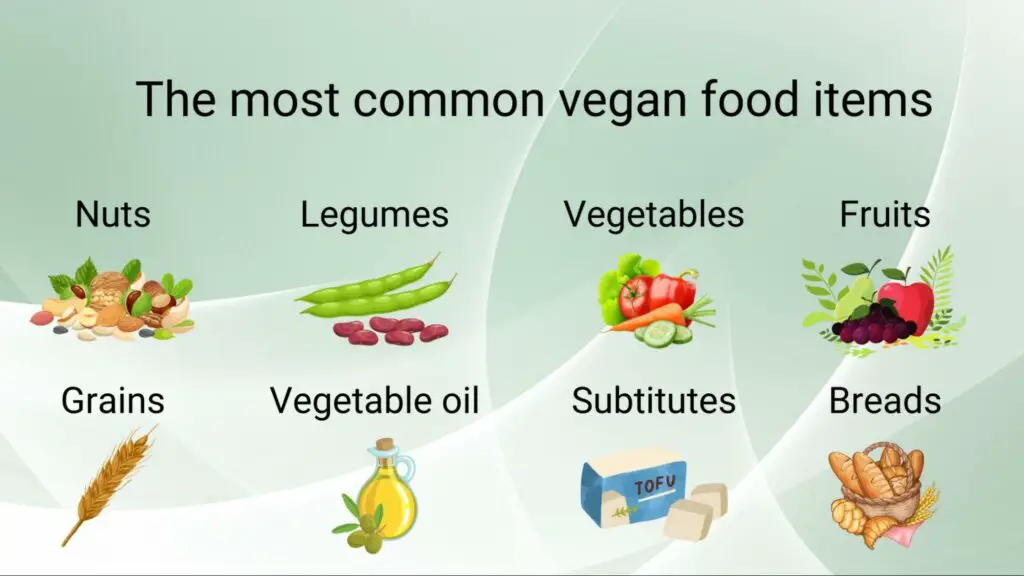
What food should vegans avoid?
In short, everything is excluded from the vegan diet that has anything to do with animals. Some of the most obvious non-vegan foods are meat, dairy products, eggs, and fish. Also, there are some food items, that sound vegan at first look, however they are not. Here is a short list of foods that you should avoid if you are following a vegan diet:
- Honey: No, honey is not vegan. You can read the explanation on the following link.
- Many different candies: Gummies, sour candies, and marshmallows are not even vegetarian since most of them contain gelatin or shellack.
- Non-dairy creamers: You can read many ceramers packages that are “plant-based” or something similar. However, it doesn’t mean that it is 100 percent vegan. Most of them still contain small amounts of dairy.
- Beverages: While many alcoholic drink doesn’t contain animal ingredients directly such as wine or beer, they are not necessarily vegan. Many brands use fish substance or casein during production that is not listed as ingredients on the label.
- Kopi luwak coffee: This is a special and expensive coffee that consists of partially digested beans. While Asian palm civets regularly eat coffee beans, nowadays most people are exploiting them to maximize their profit.
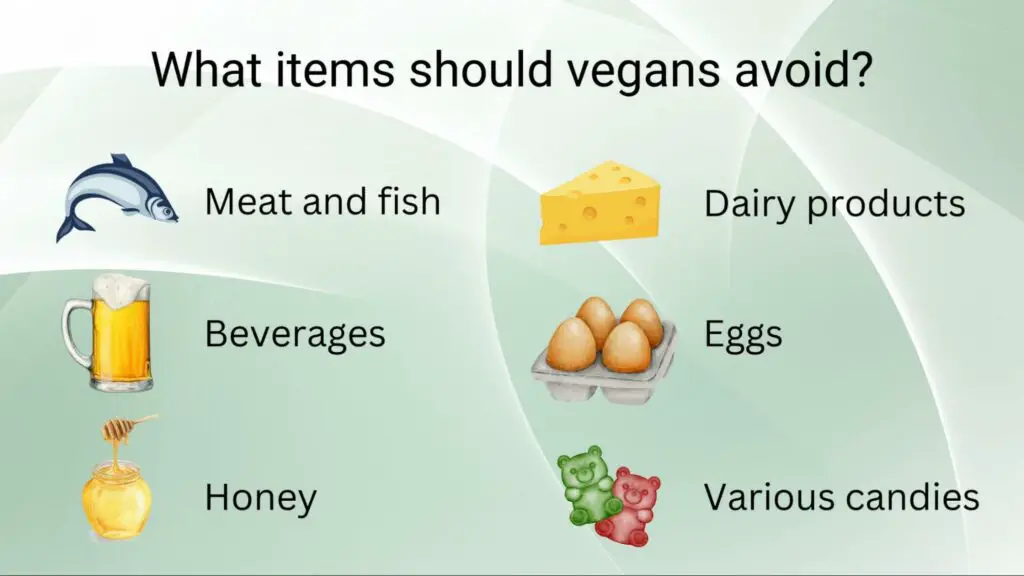
Vegan food substitutes
It isn’t easy for everyone to go vegan, so meat substitutes are a great help if somebody is missing the old tastes and textures. It may sound incredible, but in the last three years – between 2019 and 2022 – the market for meat and dairy substitutes has doubled and the trend is set to continue according to Statista. Here is the list of the most common animal derivatives product substitutes:
Plant milks
There are countless different milk substitutes, so everyone can find the one that suits their taste and the one that is best for their use.
- Rice milk: usually sweet, good for baking, and if you like your coffee with sugar.
- Almond milk: most of them have a pretty dull flavor and almond production is quite water-consuming.
- Oat milk: one of the cheapest, sustainable, and versatile alternative milk. Its taste is usually quite natural, so you can use it for any purpose. The downside is that most of the oat milk isn’t gluten-free.
- Soy milk: cheap and versatile, with a very good and dense texture.
- Other nuts: there are plenty of other different kinds of milk: cashews, peas, or hazelnuts. The last one can be delicious on its own.
If you miss the taste of milk, you won’t feel lacking either, as there are countless plant-based drinks that aim to produce alternative milk with a taste and texture that is unmistakably similar to milk.
Cheeze
Most of the plant-based cheese is made with coconut oil and natural flavors. There are many different versions of it so you can choose between vegan parmesan, mozzarella, cheddar, and so on. Usually, they add calcium and B12 to the vegan cheese to make it as nutritious and rich as regular cheese.
Plant-based meats
We also have endless possibilities for meat substitutes. Tofu and seitan have a long and rich tradition in Asia as a meat substitute. In addition to this, there are plenty of different brands that offer various different meat-like products such as Beyond Meat or Impossible Food.
